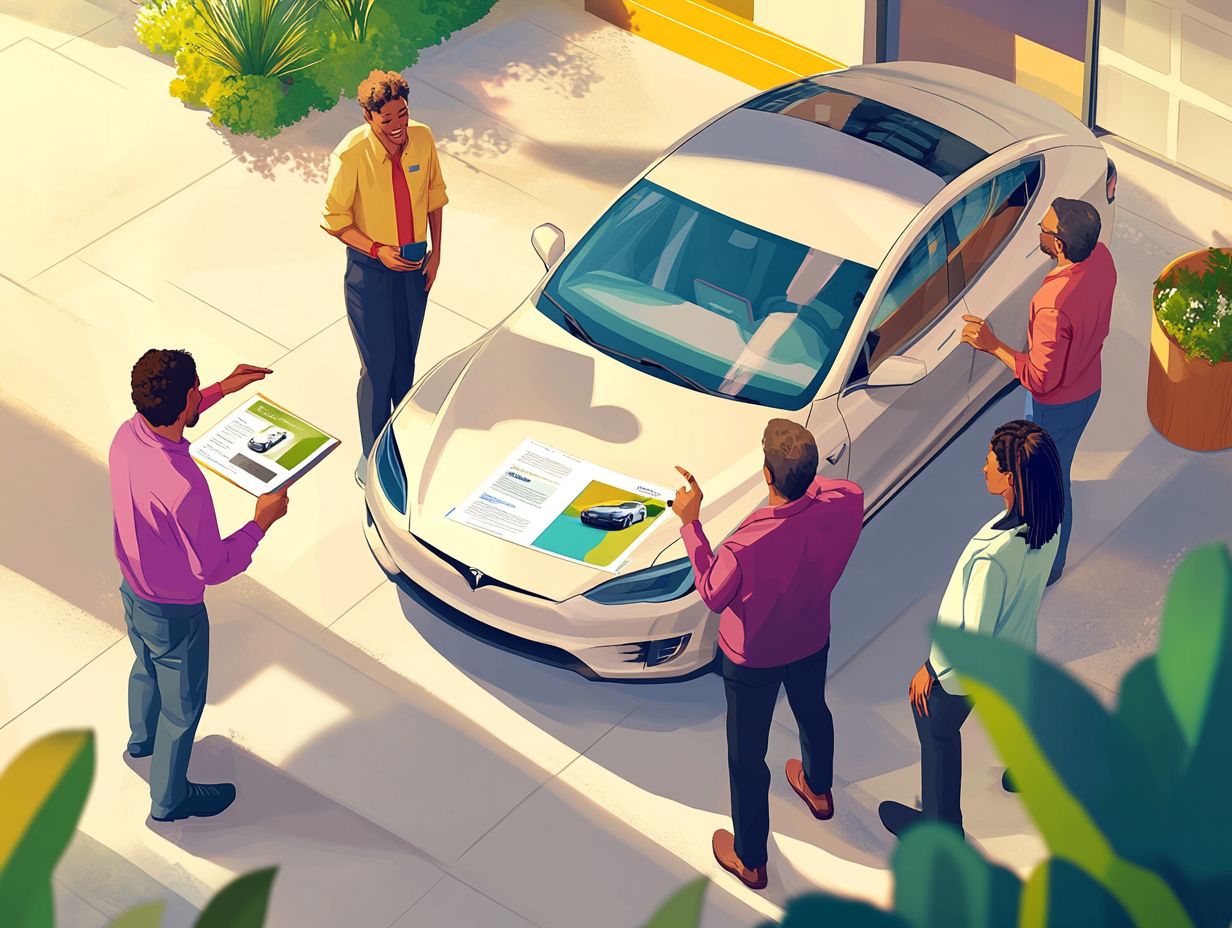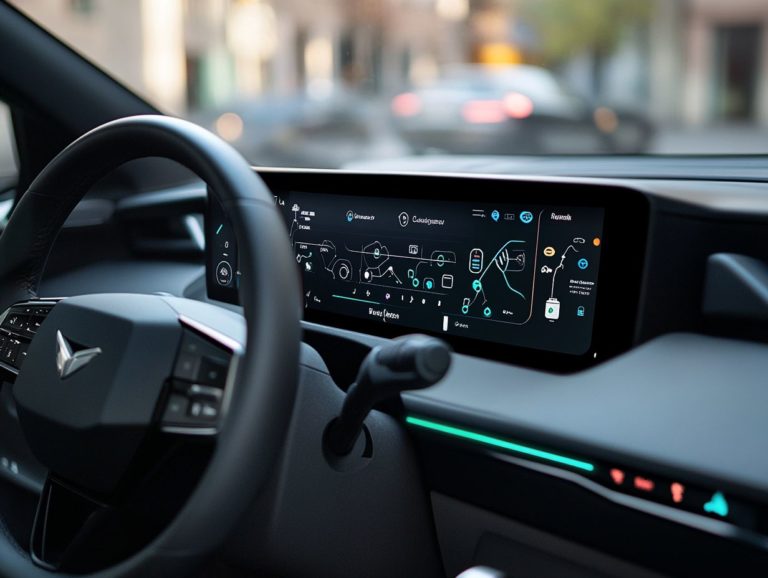5 Considerations for First-Time EV Buyers
Considering a switch to an electric vehicle (EV)? As the automotive landscape rapidly evolves, first-time buyers like you often experience a blend of excitement and uncertainty.
This article delves into five crucial factors to guide your decision-making:
- Range anxiety
- Charging infrastructure
- Battery degradation
- Cost of ownership
- Model availability
You ll discover the benefits of owning an EV, the various types available, government incentives, environmental advantages, and how to select the ideal vehicle to meet your needs.
Prepare to navigate the world of electric vehicles with confidence and clarity!
Contents
- Key Takeaways:
- 1. Range Anxiety
- 2. Charging Infrastructure
- 3. Battery Degradation
- 4. Cost of Ownership
- 5. Availability of Models
- What Are the Benefits of Owning an Electric Vehicle?
- Frequently Asked Questions
- What are the top 5 considerations for first-time EV buyers?
- What is the average range of an EV and why is it important?
- Is there enough charging infrastructure for EVs?
- How do the costs of owning an EV compare to a traditional gas-powered car?
- Do my driving habits affect the performance of an EV?
- What is the environmental impact of owning an EV?
Key Takeaways:

Range anxiety can be a concern for first-time EV buyers, but with proper planning and understanding of charging options, preparing for your first EV purchase can help manage it easily.
Consider the availability of charging infrastructure in your area when choosing an EV, as this can impact convenience and range of travel. For a comprehensive approach, check out the ultimate checklist for EV buyers.
Battery degradation happens in all EVs, but proper maintenance can help minimize it.
1. Range Anxiety
Range anxiety is a significant concern for you as a prospective electric vehicle (EV) buyer. It directly influences how you feel when driving and your overall confidence in transitioning from traditional internal combustion engines to eco-friendly options like the Tesla Model 3 or Chevrolet Bolt.
These vehicles are renowned for their impressive driving capacities and performance across diverse commuting scenarios. You may find yourself worrying about completing longer trips without the concern about running out of charge. Understanding the 5 key factors influencing EV prices can also help alleviate some concerns. Around 36% of potential buyers express that range anxiety is a primary deterrent to purchasing an EV.
Recent studies reveal that even though popular models like the Ford Mustang Mach-E and Hyundai Kona Electric boast ranges exceeding 300 miles, the lack of widespread charging infrastructure remains a significant barrier.
Advancements in fast charging technology are helping ease these concerns. Fast charging can replenish batteries in under an hour, and ongoing improvements in battery capacities further enhance the appeal of electric vehicles.
This evolving landscape is making it a great time to consider electric vehicles for your next ride.
2. Charging Infrastructure
The establishment of a reliable charging infrastructure is paramount for the widespread adoption of electric vehicles. As a prospective buyer, you re likely considering not just the availability of charging stations, but also the different types of chargers and fast charging options that enhance your ownership experience.
Your understanding of the various types of chargers can significantly influence your decision-making. Level 1 charging, commonly found in residential settings, utilizes a standard household outlet and is perfect for overnight charging, albeit with a longer wait time.
Level 2 charging stations, usually situated in public areas, offer a faster alternative, dramatically reducing your charging time and making them ideal for daily use.
If you find yourself in need of a quick energy boost, DC fast charging presents a game-changing solution, allowing your vehicle to gain substantial range in mere minutes. Innovative companies like Noodoe and Chargeway are at the forefront of this transformation, developing user-friendly apps to help you locate charging stations with ease.
By increasing your awareness of charging options and locations, you can contribute to a more robust electric vehicle infrastructure, ultimately elevating public consciousness and making electric vehicle ownership a seamless experience.
3. Battery Degradation
Battery degradation is a crucial factor for you as an electric vehicle (EV) owner, as it directly impacts both battery longevity and overall performance. You should assess maintenance and warranty details when selecting your ideal electric car model.
Understanding how your charging habits can influence battery health is vital for your experience as an EV user. Rapid charging is a quick way to charge your vehicle, while regular home charging is done at your house over a longer period. The climate in which you operate your electric vehicle significantly affects battery wear; extreme temperatures can accelerate the deterioration process.
This highlights why you should carefully consider warranty coverage, providing you with peace of mind against unexpected costs associated with battery replacement. Different models, such as Tesla and Hyundai KONA, showcase varying battery performance profiles. Considering insights on their longevity can empower you to make informed choices.
4. Cost of Ownership

Understanding the cost of ownership for electric vehicles is essential for you as a prospective buyer. You need to factor in the total cost burden associated with maintenance, tax credits, and incentives, all of which can dramatically affect your long-term investment and overall driving experience.
While an electric vehicle often comes with a significant upfront purchase price generally higher than that of traditional internal combustion vehicles this initial investment can be balanced out by lower maintenance costs. With fewer moving parts and reduced fuel expenses, the potential for substantial savings over time is definitely worth considering.
Be sure to explore available tax credits and rebates; don’t miss out on these opportunities as they can significantly lower your effective purchase price. If you’re hesitant about making a long-term commitment, consider leasing options, which can be an appealing alternative. Leasing gives you flexibility and lets you enjoy the newest electric vehicle technology.
5. Availability of Models
The availability of new electric vehicle models is expanding rapidly, presenting you with a diverse range of options tailored to your lifestyle and preferences. From Tesla’s innovative lineup to GM’s Chevrolet Bolt and performance-driven choices like the Porsche Taycan, there’s something for everyone.
As the market races toward electrification, both established players and newcomers are stepping up to the challenge. The Tesla Model 3, for example, boasts cutting-edge technology and an impressive range, making it ideal for tech-savvy drivers who prioritize efficiency. In contrast, GM’s Chevrolet Bolt shines with its affordability and practicality, making it an excellent fit for budget-conscious families.
Rivian enters the scene with its rugged, adventure-ready R1T, perfectly designed for outdoor enthusiasts. Meanwhile, Porsche’s Taycan caters to luxury consumers who crave high performance without compromising sustainability. Together, these models create a dynamic marketplace, empowering you to find an electric vehicle that aligns seamlessly with your unique needs.
What Are the Benefits of Owning an Electric Vehicle?
Owning an electric vehicle (EV) brings a wealth of benefits your way, from substantial cost savings and enticing tax credits to impressive environmental perks that align seamlessly with a more sustainable lifestyle. Plus, it elevates your understanding of eco-friendly transportation options.
You ll likely notice significant reductions in fuel and maintenance costs, given that electricity tends to be more affordable than gasoline and EVs boast fewer moving parts needing upkeep. Additionally, governments often roll out attractive tax credits and incentives, making the transition even more financially enticing.
But it s not just about your wallet. By adopting an electric vehicle, you contribute to a meaningful decrease in greenhouse gas emissions, playing your part in the global quest for cleaner air and a healthier planet. This blend of savings and sustainable living enriches your driving experience and connects you with a community committed to innovative, eco-friendly choices.
What Are the Different Types of Electric Vehicles?
Electric vehicles come in various types, each tailored to meet your unique preferences and driving needs. You have battery electric vehicles (BEVs), hybrid vehicles, and plug-in hybrids designed to cater to diverse consumer demands.
Battery electric vehicles (BEVs) run solely on electric power. They offer the benefit of zero tailpipe emissions, making them an excellent choice if you want an eco-friendly option.
Hybrids, on the other hand, combine an internal combustion engine with an electric motor. This gives you the flexibility to choose between gasoline or electricity. Such versatility is particularly valuable for longer journeys where charging stations might be few and far between.
Then there are plug-in hybrids, which seamlessly merge these two systems. They allow you to charge your batteries from the grid while still providing the reassurance of a gasoline engine for extended driving ranges.
Each of these vehicle types plays a significant role in reducing carbon footprints, making eco-conscious transportation accessible and appealing to a wider audience.
What Are the Government Incentives for EV Buyers?

Government incentives play a crucial role in encouraging you to adopt electric vehicles (EVs). They offer enticing tax credits and benefits that significantly reduce financial hurdles.
These incentives include substantial federal tax credits from the Internal Revenue Service that can provide you with up to $7,500, depending on your vehicle’s battery capacity. Individual states also have their own programs, such as rebates or tax exemptions, which can further lighten your financial load.
Local governments frequently offer measures like reduced registration fees or incentives for installing charging stations. By effectively lowering the overall cost of ownership, these incentives encourage you to consider electric vehicles as a practical choice.
This not only influences your purchasing decisions but also contributes to a cleaner, greener environment.
What Are the Environmental Benefits of EVs?
Electric vehicles (EVs) offer remarkable environmental benefits, particularly by significantly reducing greenhouse gas emissions and reliance on fossil fuels. By switching to an electric vehicle, you can embrace an eco-friendly lifestyle!
This shift is more than just a trend; it actively contributes to lowering your carbon footprint while also playing a vital role in diminishing local air pollution. This can lead to improved health outcomes, especially in urban areas where air quality is often a concern.
According to the U.S. Environmental Protection Agency, electric cars emit nearly 50% less CO2 over their lifetime compared to traditional gasoline vehicles. Plus, they can be powered by renewable energy sources, enhancing their sustainability.
By integrating solar, wind, or hydro power into your energy mix, you can drive with minimal environmental impact, paving the way for a cleaner, greener future.
It’s crucial to understand these advantages as consumer education becomes a key element in promoting sustainable transportation options. Join the movement towards a cleaner future consider making your next vehicle an electric one!
How Can One Determine the Right EV for Their Needs?
Determining the right electric vehicle (EV) for your needs involves a careful look at your driving habits, lifestyle factors, and performance requirements. To avoid common pitfalls, it’s helpful to understand the top misconceptions about buying an EV. This ensures that the model you choose aligns with your personal preferences and usage patterns.
It’s important to think about your daily routines, including the lengths of your typical commutes and how often you go on long trips. Additionally, considering tips for test driving an electric vehicle and assessing the availability of charging stations near your workplace or home can significantly influence your decision-making process.
You should identify which features are essential for you, whether it’s advanced tech, a commitment to environmental sustainability, or ample cargo space. By reflecting on your unique driving tendencies and preferences, you can narrow down your options and find EV models that meet your immediate needs and align with your long-term goals, including the 5 essential features to look for in an EV.
What Are the Common Misconceptions About Electric Vehicles?
Many myths about electric vehicles (EVs) still exist, including those regarding battery longevity, charging times, and maintenance costs. To navigate these challenges effectively, it’s important to be aware of the mistakes to avoid when buying a used EV, as these myths can confuse you and make choosing an EV harder.
You might worry that EV batteries will fail prematurely or degrade quickly. However, advancements in technology have significantly improved their lifespan, often allowing them to exceed 200,000 miles.
Concerns about the availability of charging stations are fading, as infrastructure developments are rapidly expanding to include both public and home charging options, making it more convenient than ever to charge your vehicle.
You may be surprised to learn that maintenance expenses for electric vehicles are generally lower than those for traditional gas-powered cars, thanks to fewer moving parts and less frequent servicing.
These clarifications empower you to make choices with confidence.
Frequently Asked Questions

What are the top 5 considerations for first-time EV buyers?
Here are the top 5 considerations for first-time EV buyers, including range, charging infrastructure, cost, driving habits, and environmental impact.
What is the average range of an EV and why is it important?
The average range of an EV is around 200-300 miles per charge. This range is crucial because it determines how far you can drive before needing to recharge.
Is there enough charging infrastructure for EVs?
While there may not be as many charging stations as gas stations, the number of charging stations is steadily increasing. There are also plenty of options for at-home charging. It’s important to research the availability of charging stations in your area before purchasing an EV.
How do the costs of owning an EV compare to a traditional gas-powered car?
The upfront cost of an EV may be higher, but savings on fuel and maintenance costs over time can make owning an EV more affordable. Don’t forget to check for potential tax incentives and rebates for purchasing an EV.
Do my driving habits affect the performance of an EV?
Yes, driving habits such as frequent long-distance trips or driving in extreme weather can affect the range and performance of an EV. It s important to consider your driving habits when choosing an EV with an appropriate range and battery capacity.
What is the environmental impact of owning an EV?
Compared to traditional gas-powered cars, EVs produce significantly less emissions, helping to reduce air pollution and combat climate change. However, it’s essential to consider the source of electricity used to charge the EV, as this can impact its overall environmental footprint.
For further exploration, consider checking out various EV models or local charging stations!






